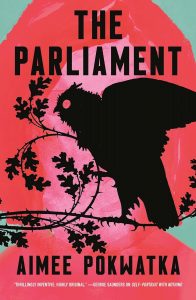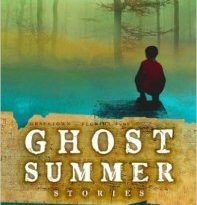Alexandra Pierce Reviews The Parliament by Aimee Pokwatka
 The Parliament, Aimee Pokwatka (Tordotcom 978-1-25082-097-6, 320pp, $28.99, hc) Cover by Jaya Miceli. January 2024.
The Parliament, Aimee Pokwatka (Tordotcom 978-1-25082-097-6, 320pp, $28.99, hc) Cover by Jaya Miceli. January 2024.
Aimee Pokwatka leans into the absurdist, and refuses explanations in her fiction. Her debut, Self-Portrait with Nothing (2022), has an artist with the ability to bring variants of her portrait subjects into this world; how this works is never explained. Rather, the focus is on relationships: between the artist’s own variants, between the artist and her child, between the artist and the public. In a similar vein, in The Parliament it’s never explained why a flock of thousands of owls has surrounded the Elmswood Public Library. Instead, the focus is primarily on both relationships, and on how people respond to crisis and trauma. (Note: The book contains discussion of school shootings.)
Madigan (Mad) Purdy is many things: a chemist, a former resident of Elmswood, a voracious consumer of knowledge, and the survivor of a school shooting which killed her childhood best friend. She is at Elmswood Public Library to teach a class on chemistry to middle-school children because one of the librarians is a friend. Mad is really not sure why she agreed – she’s not interested in teaching, she doesn’t want to be in Elmswood, and she’s unconvinced that the kids will be interested in the chemistry of bath bombs. Nonetheless, there she is. Partway through her class, a window shatters as an owl breaks the glass, and almost half the novel then follows the events of the next few days in the library. Things proceed nightmarishly: more owls break through windows; when someone tries to leave, the owls attack and kill them; when people outside attempt to get in, they too are attacked. A few dozen people are trapped together – librarians, the children, college students, members of a book club. And Nash, brother of Mad’s friend who was killed, for whom Mad has romantic feelings. Pokwatka presents a detailed and carefully thought-out story of how such a disparate group of people might react in this situation; the rational responses, the emotional responses, and all of the consequences. The children, in particular, are nuanced and believable in their range of attitudes and behaviors.
The story of the owls and the library is only half the novel. Interleaved with those events is The Silent Queen: a favorite novel of Mad’s from her childhood, which she starts reading to the children, and which becomes a source of comfort and discussion. This use of a novel-within-a-novel is similar to how Seanan McGuire used the stories of A. Deborah Baker in Middlegame (which then went on to be published as a series in their own right – Over the Woodward Wall, etc). In the world of The Silent Queen, there’s an annual pilgrimage of eight-year-old girls to a mountain and a monster, for the girls to be ‘‘Enriched’’: the monster takes part of every girl’s body – a limb, an eye – and in return gives some of them mental or physical gifts. The protagonist is Queen Alala; she is kidnapped by a neighboring princess, and together they try to do something about the monster. By itself, this story is an intriguing one, speaking to how people can be accustomed to terrible things, and how hard it is to fight cultural inertia. Experiencing The Silent Queen within the larger context of The Parliament both brings the reader’s experience closer to that of Mad and the children, and further highlights Pokwatka’s exploration of trauma and trauma responses.
The Parliament is a masterful piece of storytelling. The idiosyncrasies of Mad, in particular – her breadth of random knowledge, her magic tricks, her crippling lack of self-confidence – are developed beautifully. The horror of being trapped, with little food or water and a group of strangers, is laid out slowly and carefully. This isn’t a novel of great action, but it is never boring or slow. The crises are realistic, the people are believable, and the inexplicability of the owls’ behavior will stay with me for a long time.
Alexandra Pierce reads, writes, podcasts, cooks and knits; she’s Australian and a feminist. She was a host of the Hugo Award winning podcast Galactic Suburbia for a decade; her new podcast is all about indie bookshops and is called Paper Defiance. Alex has edited two award-winning non-fiction anthologies, Letters to Tiptree and Luminscent Threads: Connections to Octavia E Butler. She reviews a wide range of books at www.randomalex.net.
This review and more like it in the December and January 2023 issue of Locus.
 While you are here, please take a moment to support Locus with a one-time or recurring donation. We rely on reader donations to keep the magazine and site going, and would like to keep the site paywall free, but WE NEED YOUR FINANCIAL SUPPORT to continue quality coverage of the science fiction and fantasy field.
While you are here, please take a moment to support Locus with a one-time or recurring donation. We rely on reader donations to keep the magazine and site going, and would like to keep the site paywall free, but WE NEED YOUR FINANCIAL SUPPORT to continue quality coverage of the science fiction and fantasy field.
©Locus Magazine. Copyrighted material may not be republished without permission of LSFF.







